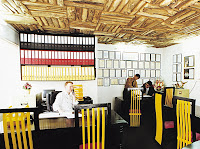I was delighted to be asked to participate as a judge in the annual Passion4Hospitality Student Debate which took place yesterday. Hosted by the Institute of Hospitality at the Victory Services Club, the stinging cold on the commute into London soon gave way to some very hotly contended verbal jousting by the brightest minds in hospitality academia today. The format seemed simple enough: eight teams of three presenting to five judges covering two topics in the hope of winning one prestigious trophy. Bring it on.
The challenge however, turned out to be as perplexing as the format seemed simple. In retrospect, I guess the real eye opener for me was seeing how many different ways a single specific topic could be interpreted and presented. Some picked up on a key word, some focused on financials, others on culture and history. All in all, it was an amazing array of thought processes to convey a message whether one was for or against the given argument.
As the day progressed, we picked a winning team from Heat One in the morning who would then go head-to-head with the winning team from Heat Two in the afternoon. The final debate took place in front of the Student Conference guests with the victors being chosen by a straightforward show of hands from the audience.
At this point, you will not be surprised if I say the winning team showed immense character, intellectual prowess and grace under pressure. But you might sit up and take notice if I said that English was not their mother tongue since they had flown in from the continent especially to take part. That really was the measure of commitment and professionalism on display as the team from The Hotelschool in The Hague raised their trophy aloft, leaving London Metropoliton University to be content with the runners-up position.
 |
| From left: Maria-Cristina Oprea, Anne Overwater, mentor & lecturer Glen Hepburn and Boudewijn Metzelaar. |
Reflecting on the day I applaud every participant for their pluck and commitment in taking part. Win or lose, they will have learned something truly special about the nature of their character and that is more valuable than any trophy or certificate.
My favourite quote of the day which I posted on Twitter shortly afterwards:
My fave quote from The Hague@ioh_online #P4H13 debate winners: 'Failing in business is more expensive than the cost of getting a degree.'
— Thomas Kilroy MIH (@mykitchensync) March 11, 2013
To read all about the debate click here for the Institute's article or check out this great post by Ioannis S. Pantelidis, the team mentor for University of Brighton who came so close on the day.
 |
| Our 'Honourable Chairman' of Judges, Russel Kett FIH presides over a tightly fought contest. |
In the meantime, I think the last word should go to Peter Ducker FIH, the Chief Executive of the Institute in his very kind note to me where he said “... the enthusiasm and engagement we saw yesterday suggests that the future of our Industry will be in safe hands.”
You can't argue with that.
Unless it becomes a topic for next year's debate, perhaps...
Unless it becomes a topic for next year's debate, perhaps...







